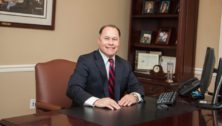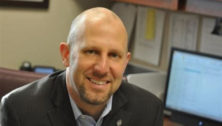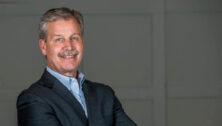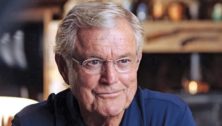Bucks County Leadership: Mike Missanelli
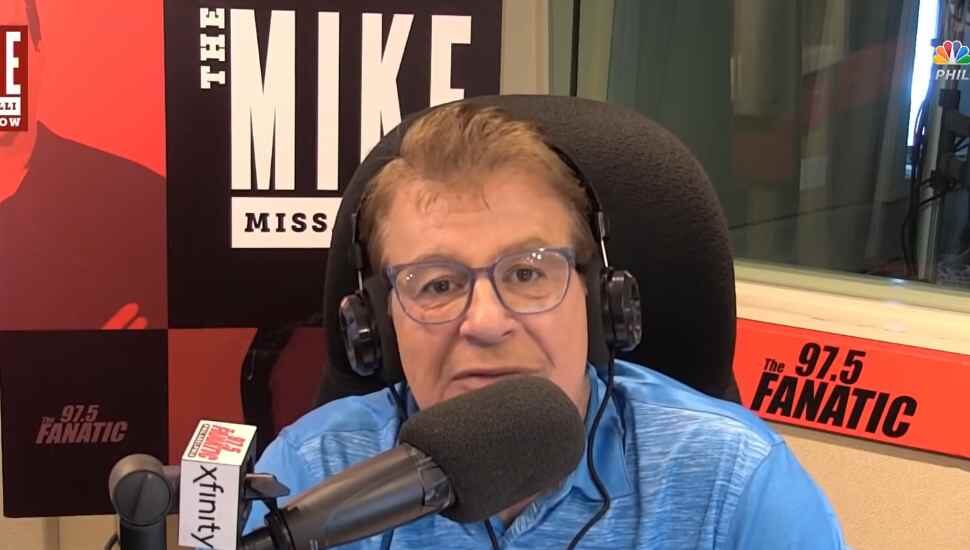
Mike Missanelli, the sports radio personality and cohost of the JAKIB Postgame Show with Seth Joyner, Derrick Gunn, and Devan Kaney, spoke to BUCKSCO Today last month about his humble beginnings growing up in Bristol, where he and his friends made their own baseball diamond. He explained why basketball was originally his favorite sport and how he ended up playing baseball at Penn State.
Missanelli also discussed his career – his first job at Montgomery Newspapers, a stint at law school, and what kept him working in journalism. He also explored the lessons he learned while working at 97.5 and shared details about the new Eagles post-game show.
Where were you born, and where did you grow up?
I was born the middle child of three in Bristol Borough. Bristol was a good place to grow up because it was not ostentatious. It was full of regular people. I got to blend with all kinds of cultures.
What did your parents do?
My dad worked for the RCA company. He started out as a TV repairman – he’s not college-educated, neither of my parents were – and he worked his way to a pretty good job with RCA, which at that time was making space components, satellites, and things. He was a quality control guy and would travel to various manufacturing places that RCA contracted to make their satellites.
My mom was a stay-at-home mom most of the time. She did some secretarial work at a place called Keystone Lighting, which was a big factory.
What memories stay with you from growing up in Bristol?
I grew up on the same street as Pete Cimino, a legendary Bucks County basketball player who once scored 114 points in a high school basketball game and went on to pitch in the major leagues.
The boys in my neighborhood found places to play ball, no matter where it was. There was a little field on the corner near my house, and we fashioned it into a field. It was bordered by hedges, and we cut out a diamond.
The key was to hit it over the hedges when we were playing Wiffle ball. Of course, the Wiffle ball would go over, and there was a nasty neighbor on the other side.
You took to baseball pretty early. Was that your favorite sport?
Basketball was actually my favorite sport growing up. When you grow up back then, all you do is play ball for all seasons, from football to basketball to baseball.
I was a very precocious basketball player. At age 14, I went to the Sunny Hill basketball camp and scored 43 points in a game. And this was against really high-level players from the city. I thought I was going to be a star basketball player. I didn’t realize at age 14 that I wasn’t going to be 6’4”.
I always played baseball, and I was good at that. I played in American Legion Baseball and travel team leagues every summer. I got to play with a lot of really good players.
I went to Penn State, and I was a preferred walk-on. I ended up making the team. I went there as a shortstop and wound up playing second base.
Were you any good?
Well, I’m sitting here, so as you can see, I wasn’t good enough to make it to the next level. But I was a good player and fielder and became a much stronger batter and line-drive hitter in college.
What did you take from that experience?
Penn State is a big university. If you’re from a little town, I think the natural inclination is that you can’t compete against big boys. I didn’t know if I could, either, but I figured, what the hell? What do I have to lose here? Rely on what I could do; if it’s not good enough, it’s not good enough.
You came into yourself through that experience.
Absolutely. There’s no question that it gave me a world of confidence, not only in the sport but in life. Penn State can be an overwhelming place, so it helps if you have something that reduces the size of the university, and baseball did that for me.
Why Penn State?
My parents said, “That’s where you’re going!” I wanted to go to Columbia University because I wanted to major in journalism. Columbia was a great journalism school, and I think my grades were good enough to get in. But my parents were between the crack where I wasn’t going to get a lot of financial aid, and my dad looked at the tuition and said, “We can’t do it.” I applied to various schools, but my brother had gone to Penn State, so I was familiar with it.
Looking back, was Penn State a good choice for you?
I think Penn State was a good choice. The only thing about it is, that it’s almost a fairy-tale land. When you get there, you’re so insulated in this big rectangle where everything is sweetness and light, and then you have to go back to life. It was so cold in Happy Valley I was forced to study longer. There simply wasn’t anything else to do.
What music were you listening to back then?
In the 70s, I liked the classic rock of The Who and Led Zeppelin. But I was very eclectic. I was listening to Chick Corea and Return to Forever, Gino Vanelli.
And then in the 80s – at the end of the 70s, you were either a rocker, or you went disco. Coming into the 80s, it came into New Wave, which I liked. And then the 90s grunge took over with bands like Fuel and Garbage. I was into all of that.
Today, satellite radio has made a huge difference in my life. I love the new music that’s coming out, the indie bands and the alt bands.
Across all of that, do you have a favorite artist?
I really don’t have a favorite artist – I can’t pinpoint just one. I like The National. Back in the New Wave era, I was captivated by Tears for Fears, because they had this orchestral feel to them. I think that’s what turns me on – the musicianship in a rock band.
Where does your eclectic music taste come from, Mike?
I was always into music. My brother was a sixties doo-wop’er who used to go to Jerry Blavat concerts. I got into buying albums in my teens. My very first album was the Double Album from Chicago. I played trumpet when I was younger and appreciated Chicago’s horn sound.
You ended up going to law school – how did that happen?
When I got out of college, I got a job right away at Montgomery Newspapers in Fort Washington. It was such a great journalistic experience – I got to write, I got to edit, I got to make the headlines, I got to do the pay stubs. But it was small-time. I remember my first salary was $12,000. I said, if I’m going to stay in newspapers, I need to work at a major metropolitan newspaper.
I applied to several newspapers, including the Philadelphia Inquirer, and I said, if I don’t get a job within five years, I’ll go to law school. Five years went by, and I applied to law school. I got accepted to law school in the spring and the Inquirer, literally three weeks later, offered me a job.
I said, wow, these are two great opportunities; if I can make them both work, that’s what I’ll do. So I went to law school at night and worked in a bureau for the Inquirer during the day. I would leave the Inquirer’s office at 5:00 and head down to Delaware Law School – Widener in Wilmington. It was a pretty extensive schedule because I was taking 16 to 18 credits at night. I didn’t have a social life for a long time.
When I got out of law school and passed the boards, I figured that was the end of my journalistic career. I went to the Inquirer management and said I would love to work for them in libel law. They contracted big law firms to do all their libel work, so that wasn’t going to happen. But they asked me if I would stay on for another year to cover college basketball.
I wasn’t sure if I wanted to do it, but they said, “The first assignment is in Maui.” They were going to send me to cover Villanova, playing in the Maui Classic. I said you know what, I can do this for a year. Meanwhile, law schools were just pumping out graduates at the time. A lot of my buddies were getting entry-level jobs that paid less than what I was making at the Inquirer, and they were miserable.
I said you know what, I’ll stay here for just a little while. And one year turned into six years. I was flying all around – this was when newspapers were viable. They were committed to journalism. Obviously, newspapers just hit the wall, and it’s a shame because newspapers were very rewarding for me. I loved doing it.
Looking back over your career, Mike, who saw promise in you as a writer or a broadcaster?
There was a guy at the Inquirer. His name was Glenn Guzzo. When I first applied, I had very few clips from Penn State – because I was so busy, I didn’t really have a chance to work full-time with the newspaper. I covered the fencing beat – that was the only beat they had left. I turned that beat into something that you could write about. All these kids were from Long Island – upper-crust kids who grew up fencing. My stories were different than just a fencing match result.
That’s the way I saw journalism – that there was always a story to tell, and I guess my clips were good enough to get me that job. Glenn Guzzo was the sports editor at the time, and he saw something in me.
How did you make the jump from newspapers into broadcasting?
When WIP went all-sports, they had the morning show with Tom Brookshier, and he didn’t want to do four hours. We convinced them that a bunch of us from the Inquirer sports table could come on and take that last hour, just talk about the stuff we were covering. We knew what we were talking about and had personalities that they noticed.
Then they offered me some weekend spots. To me, it was a lark. I never looked at sports talk radio like it was going to evolve into a career. I was just having fun with it.
Angelo Cataldi was the first Inquirer sport-writer to leave the newsroom and make the jump to WIP and sports-talk radio. We all were flabbergasted. Cataldi was a seasoned pro that everyone looked up to; he had a great beat covering the Eagles and was the most respected guy in the newsroom. It took us all back when he left the newspaper for talk radio.
I was doing a weekend show with Stan Hochman every Saturday, “The Weekend Warriors.” They liked what they were hearing from me. They offered me a job with Steve Fredericks, who was the essence of a talk radio guy and was rebounding from his career. The program director thought it would be a good dynamic to partner Steve Fredericks, a seasoned veteran guy, with me, this upstart, brash, know-nothing guy who would be silly.
Tom Bixby the program director, was a taskmaster beyond belief. We all hated him at various times, but we all learned how to do radio from him. His idea about radio was that no one cares that much about daily sports. But if you can present that along with life, that’s what people are interested in.
That might be the best talk radio practice today, but for that time, it was revolutionary.
It was. We talked about our lives. Whatever misery or glee we went through, we shared it. We were honest, and I think people appreciated it because they were going through similar things. So they listened, and they listened for a long time. The key to radio is this thing called “time spent listening,” TSL. If you have TSL, that attracts advertisers who want to spend dollars with you because listeners are going to stay there, and they’re going to hear the ad.
Tell me about this new initiative you have underway.
The way things ended up at Sports-radio 97.5 was kind of strange to me. I was kind of stunned by the whole matter. I didn’t know what I was going to do, and I said, well, maybe it’s just time to stop it completely. If people were interested in offering me something, I would listen to them, but I wasn’t determined to get back on the horse. That was until Joe Krause and Jay Comini called me. He said, “Listen, I want to do this Eagles post-game show.”
Joe said, “We’re going to do a show with Seth Joyner and Derek Gunn, and we’d like you to be the quarterback of it.” I said, “Well, that sounds interesting.”
I thought the harmony between us would be really good. I’m opinionated, but I know I’m not as opinionated as Seth, and I’m not as knowledgeable as Derek Gunn, so I’m kind of in the middle of opinion and knowledge, but also, I can move a conversation pretty well. I know exactly how I can move Seth and Derek. So I think it’s going to be fun and interesting.
You can watch it anywhere – on your phone, computer, or smart TV. It’s going to be on 6ABC.com, or YouTube, whatever’s easier. It’ll be live after the game. Then, during the week, we’ll do a one-hour show to review and look forward to the next game. I’m excited about it.
What do you like to do in your free time, Mike?
Well, my free time has been curtailed severely because I had major foot surgery. I did it playing basketball. I had a torn tendon that tore off my foot bone and rolled up toward my ankle. So I’ve been on the shelf for a long time. I just recently, last week, started to play golf.
Do you have a favorite course you like to play?
I play at Whitemarsh Valley, primarily. It’s my home course, but I’ll play all over. I’m going to Kiawah Island in a few weeks on vacation to play down there, the ocean course, which everyone raves about. Tomorrow I’m going to play at Hartefeld in Chester County.
Do you read much?
Yes, I try to read as much as I can. It’s so easy to watch videos now that it’s taken away my zeal for reading. But when I read, I try to read classic materials, like Faulkner and F. Scott Fitzgerald. They’re such classic literature that anything else seems a bit shallow.
What keeps you hopeful and optimistic, Mike?
I’m not optimistic right now; I’ve got to be honest with you. I don’t understand how reasonable-minded people can think a certain way these days. I’ve watched this country almost go back to the Confederacy, and then – I lived through Nixon – I saw how responsible people just didn’t put up with his crookedness in that kind of an office. I just don’t understand what happened to make us less evolved.
I know a lot of people hate that I say that. A lot of people thought I was too political on the air. But I’m not political at all. I’ve always said that I go by the tenets of the party of Mike. Whatever is logical and seems more right than wrong is the extent of my politics.
Finally, Mike, what’s the best piece of advice you’ve ever received?
I think it was from Steve Fredericks, who I worked with at first. I always doubted myself when I was on the air. He said, “You have an ability to converse with every person, so trust your instincts and your intelligence, and above anything else, be honest and be yourself, because nobody can take that away from you. Even if you rub people the wrong way, at least you’re being honest and put your heart into everything you put out there.”
That’s what I tried to do. Whether I accomplished it, I don’t know – I hope I did – but every day, I never worried about whether I would hurt somebody’s feelings by saying something that I interpreted as the truth. I said, if I have to start self-editing myself, then I’m not honest with the listening audience, and that’s who I work for.
I got tenderized at a very early age by Rollie Massimino and John Cheney, two very strong personalities. I had to learn how to walk that line between being honest and not being authentic. John Cheney became a friend and one of the greatest people I’ve ever known. Rollie did not! Rollie was a grudge holder. On the other hand, Chaney realized I was honest and respected my viewpoint.
_______
Editor’s Note: This profile of Mike Missanelli first appeared on BUCKSCO Today in September 2022.
Connect With Your Community
Subscribe for stories that matter!
"*" indicates required fields


























